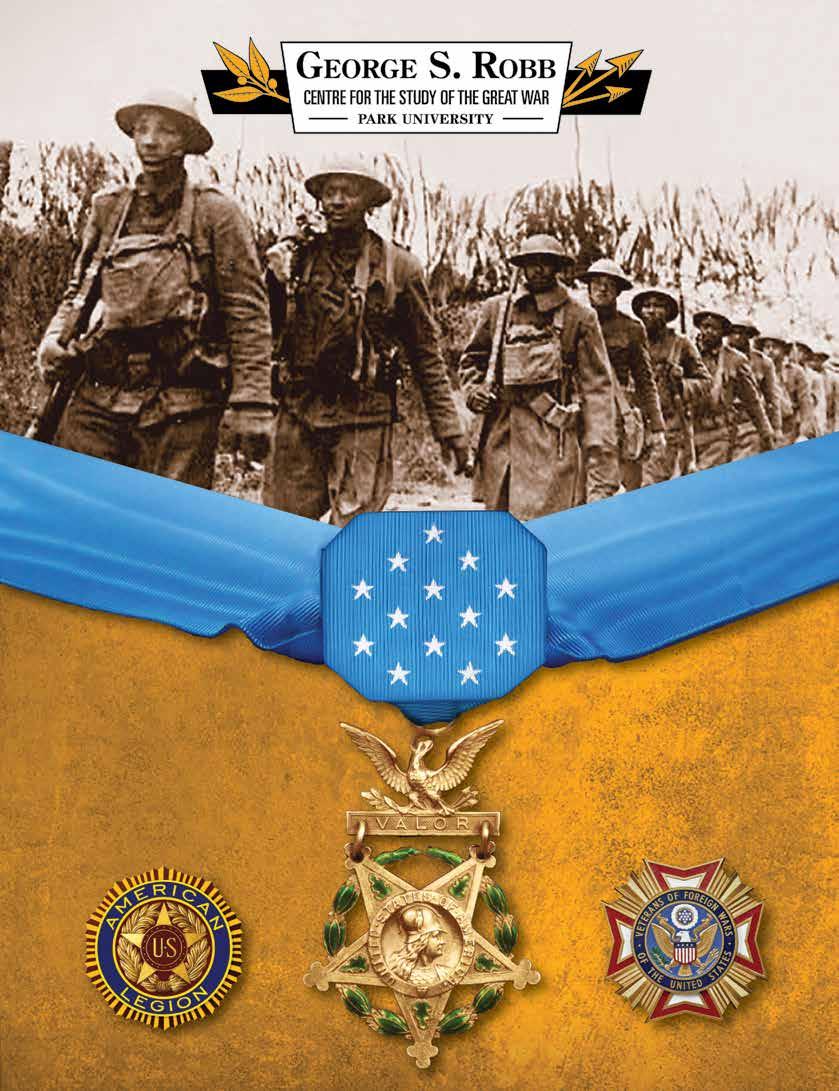
3 minute read
Park leads nation to right the wrongs of the past
Valor Medals Review project aims to posthumously honor minority WWI service members denied nation’s highest honor.
Approximately one million minority Americans served in the U.S. military during World War I. However, only seven of 120 Medals of Honor have been awarded to World War I service members of minority background.
Advertisement
Although the military has completed systematic reviews to identify minority veterans who were unjustly denied the Medal of Honor in past wars — World War II, the Korean War, the Vietnam War and all subsequent conflicts — no such review has ever been completed for World War I.
Until now.
“Park University has stepped up to lead a national effort to right a terrible wrong,” said Timothy Westcott, Ph.D., associate professor of history and director of Park’s George S. Robb Centre for the Study of the Great War.
The Robb Centre — which will be housed in the recently relocated Park House on the east side of the Parkville Campus — is named after 1st Lt. George S. Robb, a 1912 Park graduate and white officer who led a company in the predominantly black “Harlem Hellfighters” (previously the 15th New York National Guard, which logged more combat days and casualties than any other American regiment). Robb was a 1919 Medal of Honor recipient.
In June 2018, a resolution of The Doughboy Foundation (formerly the U.S. World War One Centennial Commission) established the Valor Medals Review Task Force, co-chaired by Westcott. The task force’s goal is to create a digitized database of every World War I service member researched as part of this study and to forward a group of Medal of Honor recommendations for the appropriate military secretaries to consider.
Westcott, a U.S. Marine Corps veteran, along with a team of Park undergraduate students, are analyzing the service records of minority service members — African Americans, Hispanic Americans, Jewish Americans, Native Americans and Asian Americans — to determine if discrimination played a role in being denied the Medal of Honor. To date, the Park research team has identified hundreds of service members who meet the criteria for the study: those who were awarded the Distinguished Service Cross/Navy Cross but not the Medal of Honor, and may have been awarded France’s equivalent of the Medal of Honor, the Croix de Guerre with Palm.
The team continues to sift through records dating back 100 years, including maps, service documents, weather reports and witness accounts. Research at Park is being conducted in conjunction with The Doughboy Foundation and the U.S. Foundation for the Commemoration of the World Wars.
The work of the Valor Medals Review is supported by bipartisan legislation (H.R. 2249 and S. 1218) currently before Congress. The bills propose that the Secretary of the Army and Secretary of the Navy review service records of African American, Asian American, Hispanic American, Jewish American and Native American service members specifically identified by the Valor Medals Review Task Force to determine if they should be recommended for the Medal of Honor based on the results of the review. The bills also waive the statute of limitations.
For its leadership of the project, Park University has attracted regional and national media attention, including “CBS Evening News,” Politico and National Public Radio.
For student researcher Joshua Weston, sophomore European/classical history major who also served in the military, being a part of the project is a special honor. “This is the height of racism before the civil rights movement, yet these men were fighting for a country that took them for granted,” he said.
If the bills are approved, Westcott said the project could take seven to 10 years to complete. While conducting the project, the team contacts descendants of the service members to notify them of the research.
“If there are corrections to make, it is time to make those corrections in the bigger picture of reconciliation as a nation,” Westcott said. “We are going to fix it with the best forensics and genealogical and historical research that we have available.”
Valor Medals Review

The Valor Medals Review project is officially endorsed by The American Legion, the Congressional Black Caucus Veterans Brain Trust and The Veterans of Foreign Wars. To learn more about the Valor Medals Review project, visit gsr.park.edu.










